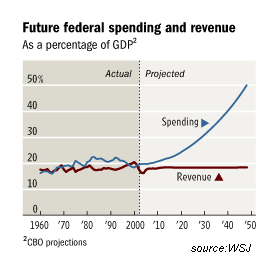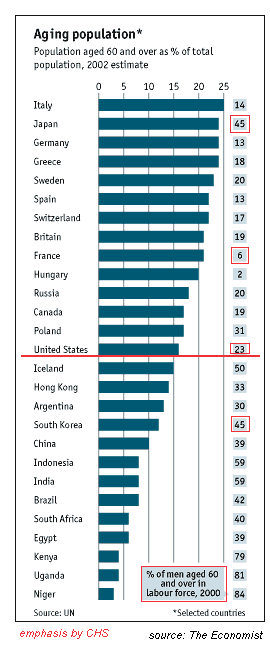

|
| weblog/wEssays archives | home | |
|
Protecting Capital V: The Demographics of Decline (September 9, 2006)  Astute reader Kevin K. recommended this article by Bill Gross, well-known bond guru at
Pimco: Investment Outlook,
September 2006: No Cuts, No Butts, No Coconuts, a long, thoughtful essay on the
demographics of the Baby Boom retirement and the financial consequences of that demographic.
Astute reader Kevin K. recommended this article by Bill Gross, well-known bond guru at
Pimco: Investment Outlook,
September 2006: No Cuts, No Butts, No Coconuts, a long, thoughtful essay on the
demographics of the Baby Boom retirement and the financial consequences of that demographic.
Before I quote from the essay, take a look at this small chart. It more or less encapsulates the dilemma Mr. Gross describes: there is no way in goldurn heck we as a nation can pay for the entitlements (Medicare and Social Security) which have been been promised to the Baby Boom generation--all 77 million of us, about a quarter of the entire U.S. population. And "we" start retiring in less than two years. Here are some insights from Mr. Gross: (emphasis added) Something has to give way. In financial terms alone, Laurence Kotlikoff, a Boston University economist has estimated the unfunded liabilities of Americans associated with healthcare and retirement amount to $80 trillion, over seven times our annual GDP!Talk about heresy! To state the obvious, that tomorrow's workers will be unable to fund the sort of lavish retirement that is being heaped on the present generation--why, it's heresy of the first order! Doesn't Bill Gross know that we can just borrow another trillion or two from the Japanese, Chinese and Saudis to fund the Baby Boom's big-bucks retirement? Doesn't Bill know that borrowing more is the painless solution to all problems? Get with the program, Bill. Don't frighten us with all that stuff about being in the hole $80 trillion and having to work past 62... whew, you had us going there. Next thing you know, Bill will be saying crazy stuff like housing can actually decline for years or even decades. Come on, Bill, I'm gonna be living like a millionaire once I sell my crib, without having to save a dime or work another day. Housing never drops nationally, it only rises, decade after decade, magically enriching us all. Ah, but Bill gets the last word, and its a doozy: Too late to have babies, too politically sensitive to import more workers, too daft to recognize that the boomer winter is rapidly approaching and that our assets will not fund our liabilities. Too, too. Too, too. Too, too. What does a government do that is too absorbed in the moment and fails to alert its citizens to the perils ahead? Cut in line, I suppose. It devalues its currency, it reflates/inflates its economy, and because that doesn’t create real wealth, it recites the mythology of a bygone era, of a “shining city on a hill,” so that its citizens believe they’ve never had it so good.  The 2008 retirement of the Boomers born in 1946--the first year of the Boom-- has been
drawing a lot of media attention, and for good reason: if Medicare and Social Security
are running huge deficits now, what happens as millions of Boomers start retiring and
drawing their entitlement benefits?
The 2008 retirement of the Boomers born in 1946--the first year of the Boom-- has been
drawing a lot of media attention, and for good reason: if Medicare and Social Security
are running huge deficits now, what happens as millions of Boomers start retiring and
drawing their entitlement benefits?
Not only that, but as other commentators have asked, what happens to the housing market when Boomers start selling off their primary residences and investment properties? Given that the generation behind the Boomers is much smaller in number, who exactly is going to buy all those millions of properties? What if the supply of housing for sale swamps the demand, not just for a year or two but for a decade or two? What happens to the price of any commodity when the over-supply is basically permanent? Then there's the financial assets, stocks and bonds. As Boomers start drawing upon their IRAs and 401K plans, guess how they will raise cash--by selling the stocks and bonds in their retirement accounts. Selling them monthly, year after year, or liquidating them in huge chunks to pay retirement or healthcare costs. What happens to the stock and bond markets when there is an unceasing wave of relentless, decades-long selling by millions of retirees? Exactly who will be the buyers of the hundreds of billions in stocks and bonds which will soon be liquidated? The saying is, "Demographics is destiny," and while that may over-simplify things, it certainly speaks to the power of raw numbers and simple multiplication. Programs such as Medicare which were designed in the 1960s to pay modest sums for the care of a few million poor elderly are now on the entitlement hook for tens of millions of oldsters, millions of whom are loaded, wealthy, rich, call it what you will--and their care is anything but modest. One solution has also been posited by various pundits--a return to thrift and savings. If middle-aged American wage earners changed from saving -1% of their earnings to 10% positive savings, then their retirement might actually have a chance to be funded. But what happens to a consumer economy utterly dependent on, well, consumer spending, for 70% of its GDP? The loss of 10% of that spending would sink that economy faster than a torpedo, taking profitability and hence the stock market with it. Last but not least, here are two links worth checking out. Fred Roper's Blog: Fred makes a fascinating argument based on Christian theology for a national healthcare system, and I think he's onto something important. As a lawyer, he also rightly traces many bankruptcies not to slovenly finances but to medical expenses. We live in a country where a brief hospital visit can cost $700 and treatment for a heart attack can run to six figures. What kind of insanity is this, and why do we as a citizenry tolerate it? In any event, check out Fred's blog for more on these topics. Correspondent Michael Goodfellow also recommended the The Prudent Bear website. If you're skeptical of the Goldilocks economy, check it out. For more on this subject and a wide array of other topics, please visit my weblog. copyright © 2006 Charles Hugh Smith. All rights reserved in all media. I would be honored if you linked this wEssay to your site, or printed a copy for your own use. |
||
| weblog/wEssays | home |